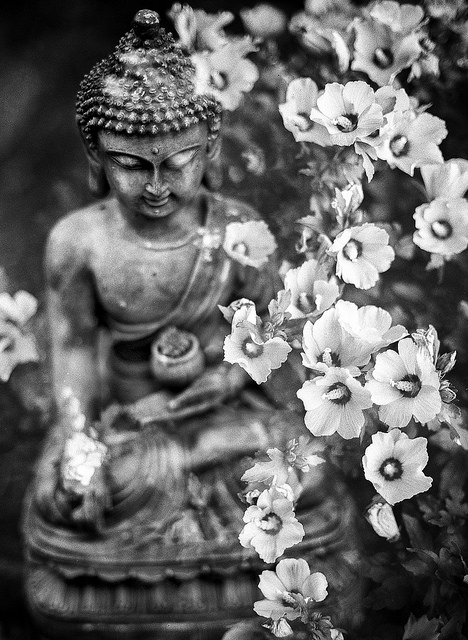I met the Buddha in Mountain View, California, in the autumn of 2003.
I had achieved my dream of moving from the Lone Star State to the Golden State. I’d been practicing yoga on and off for a decade but had never really delved into meditation outside of my yoga practice.
Shortly after relocating to the Bay Area (also known as the land of endless holistic health opportunities), a simple flyer prompted me to show up to the Mountain View Zen Center group sit one evening with an authentic beginner’s mind.
I sat on a black cushion facing the wall in a quiet room with about 20 other people sitting on black cushions facing the wall. I had no idea what to do, other than sit there and breathe. There was no technique given, no guided meditation or direction, no incense or music.
I remember finding it exceedingly weird to be just sitting and breathing and staring at the white wall. I remember stifling the urge to giggle at times. I remember the near constant stream of thoughts: What am I doing here? How long has it been? How much longer? What if I fart? What am I going to eat for dinner after this? Am I doing this right?
At the end of the sitting period, a bell rang, and everyone turned around to sit in a circle. There was a short dialogue in which a few of the attendees made comments or asked questions which were addressed by the teacher.
This was my very first taste of Buddhism, and I’ve been fascinated and transformed by the multifaceted, practical, and precious dharma teachings ever since.
The teachings of the Buddha are extensive. Some are simple, others quite esoteric. There are many lineages and sects of Buddhism. My primary teacher comes from the Vajrayana line of Tibetan Buddhism. I also appreciate aspects of Mahayana, and Zen, and other flavors of the dharma.
My favorite modern-day Buddhist teachers include Alan Watts, Pema Chödrön, Natalie Goldberg, and Joseph Goldstein. I feel immense gratitude for the masters from the East who have seeded the teachings in the West—especially Chögyam Trungpa, the Dalai Lama, Suzuki Roshi, S.N. Goenka, and Thích Nhất Hạnh.
Without further ado, here are a few of my most beloved and life-altering gems of dharma wisdom. May they be of benefit!
1. Life is suffering. Suffering results from clinging. There is a way out. Mindful awareness of the eternal now is the way to peace, wholeness, and bliss.
These are the Four Noble Truths of the Buddha, paraphrased. Life cannot be separated from suffering, sickness, old age, and death. These are the facts. We suffer when we cling to our attachments and aversions, our plans and expectations. Through the practice of mindfulness meditation we can alter our relationship to our mind.
There’s also this whole deal called the Eightfold Path, which is sort of tricky because it means the fourth Noble Truth actually has eight multifaceted aspects (right view, right resolve, right speech, right conduct, right livelihood, right effort, right mindfulness, and right “samadhi”). So, there are technically 12 Noble Truths.
2. All we need is metta.
Metta is the practice of sending love, friendliness, and kindness to all beings without exception.
“Peace requires us to surrender our illusions of control. We can love and care for others, but we cannot possess our children, lovers, family, or friends. We can assist them, pray for them, and wish them well—yet, in the end, their happiness and suffering depend on their thoughts and actions, not on our wishes.” ~ Jack Kornfield
Nevertheless, it doesn’t hurt to wish. Doing metta practice is simply sending good wishes for ourselves, our loved ones, our acquaintances, and ultimately every single sentient being in the universe.
May we be safe. May we be happy. May we be healthy. May we live with ease. May we be free.
3. Let go like a warrior.
Spiritual practice is all about letting go of our tendency to constantly dwell in the past and/or the future—and instead, fully embracing the present moment (in which, sometimes, we are recalling memories of the past or making plans and projections for the future).
I am currently reading Shambhala: The Sacred Path of the Warrior by Chögyam Trungpa, and I am so moved by his generous and pragmatic teachings. Here are two inspiring quotes from the book:
“Training yourself to be a warrior is learning to rest in basic goodness.”
“Warriorship is a continual journey. To be a warrior is to learn to be genuine in every moment of your life.”
4. Reconnect with awareness in every step.
Gratitude is the strongest and most durable foundation for our lives—remembering that each breath is a gift. Life is not about eternal happiness. It is about being real, being here, witnessing and holding space for all that arises. Reflecting, growing, modeling health and genuine humanness. It’s doing the inner work each day so that our light can shine out and benefit others.
“You have to remember one life, one death—this one! To enter fully the day, the hour, the moment, whether it appears as life or death, whether we catch it on the in-breath or out-breath, requires only a moment, this moment. And along with it all the mindfulness we can muster, and each stage of our ongoing birth, and the confident joy of our inherent luminosity.” ~ Stephen Levine
~
Author: Michelle Margaret Fajkus
Image: Flickr/Benjamin Balázs
Editor: Yoli Ramazzina
Copy Editor: Khara-Jade Warren
Social Editor: Nicole Cameron


 Share on bsky
Share on bsky





Read 1 comment and reply